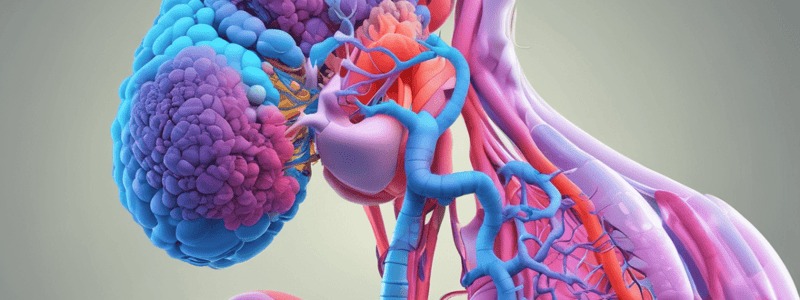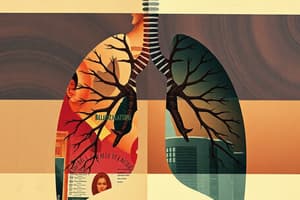Podcast
Questions and Answers
What is the main difference between atmospheric air and alveolar air?
What is the main difference between atmospheric air and alveolar air?
- Atmospheric air contains more carbon dioxide, while alveolar air contains more water vapor.
- Atmospheric air has a higher partial pressure of oxygen, while alveolar air has a higher partial pressure of carbon dioxide. (correct)
- Atmospheric air contains more nitrogen, while alveolar air contains more oxygen.
- Atmospheric air has a higher overall pressure, while alveolar air has a lower overall pressure.
What are the three main components of the respiratory membrane?
What are the three main components of the respiratory membrane?
- Alveolar membrane, capillary wall, and pleural fluid.
- Alveolar membrane, interstitial fluid, and capillary wall. (correct)
- Alveolar membrane, bronchial wall, and capillary wall.
- Alveolar membrane, interstitial fluid, and bronchial wall.
According to Fick's law, which of the following factors is directly proportional to the rate of gas diffusion?
According to Fick's law, which of the following factors is directly proportional to the rate of gas diffusion?
- The molecular weight of the gas.
- The pressure gradient across the respiratory membrane. (correct)
- The thickness of the respiratory membrane.
- The solubility of the gas.
What is the approximate thickness of the respiratory membrane?
What is the approximate thickness of the respiratory membrane?
Which of the following factors is inversely proportional to the rate of gas diffusion according to Fick's law?
Which of the following factors is inversely proportional to the rate of gas diffusion according to Fick's law?
What is the overall pressure of atmospheric air?
What is the overall pressure of atmospheric air?
Which of the following gases has the highest solubility in the respiratory membrane?
Which of the following gases has the highest solubility in the respiratory membrane?
Which of the following factors would increase the rate of gas diffusion across the respiratory membrane?
Which of the following factors would increase the rate of gas diffusion across the respiratory membrane?
What is the main cause of decreased gas exchange in emphysema?
What is the main cause of decreased gas exchange in emphysema?
What is the relationship between the diffusion coefficients of CO2 and O2 across the respiratory membrane?
What is the relationship between the diffusion coefficients of CO2 and O2 across the respiratory membrane?
What is the reason for the difference between the PO2 of blood leaving the alveolar capillaries and the PO2 in the systemic arteries?
What is the reason for the difference between the PO2 of blood leaving the alveolar capillaries and the PO2 in the systemic arteries?
Which of the following factors would most increase the diffusion of oxygen across the respiratory membrane?
Which of the following factors would most increase the diffusion of oxygen across the respiratory membrane?
What is the main cause of decreased gas exchange in bronchial asthma?
What is the main cause of decreased gas exchange in bronchial asthma?
What is the partial pressure of oxygen (PO2) in the blood leaving the alveolar capillaries?
What is the partial pressure of oxygen (PO2) in the blood leaving the alveolar capillaries?
What is the partial pressure of carbon dioxide (PCO2) in the blood leaving the alveolar capillaries?
What is the partial pressure of carbon dioxide (PCO2) in the blood leaving the alveolar capillaries?
Which of the following is a component of the respiratory membrane?
Which of the following is a component of the respiratory membrane?
What is the difference between atmospheric air and alveolar air?
What is the difference between atmospheric air and alveolar air?
According to the information provided, what is the primary factor that affects the diffusion of gases across the respiratory membrane?
According to the information provided, what is the primary factor that affects the diffusion of gases across the respiratory membrane?
What happens to the surface area of the respiratory membrane during exercise?
What happens to the surface area of the respiratory membrane during exercise?
Which of the following conditions would decrease gas diffusion across the respiratory membrane?
Which of the following conditions would decrease gas diffusion across the respiratory membrane?
If the partial pressure of oxygen (PO₂) in the alveolar air is 100 mmHg and the partial pressure of oxygen in the venous blood is 40 mmHg, in which direction will oxygen diffuse?
If the partial pressure of oxygen (PO₂) in the alveolar air is 100 mmHg and the partial pressure of oxygen in the venous blood is 40 mmHg, in which direction will oxygen diffuse?
Which gas has a higher diffusion coefficient than oxygen, based on the information provided?
Which gas has a higher diffusion coefficient than oxygen, based on the information provided?
What is the primary factor that affects the rate of diffusion, according to the equation $\frac{1}{D} \propto \frac{d}{A}$?
What is the primary factor that affects the rate of diffusion, according to the equation $\frac{1}{D} \propto \frac{d}{A}$?
Which condition would result in a high ventilation-perfusion ratio (V/Q), leading to decreased gas exchange?
Which condition would result in a high ventilation-perfusion ratio (V/Q), leading to decreased gas exchange?
According to the information provided, which factor would NOT directly affect gas diffusion across the respiratory membrane?
According to the information provided, which factor would NOT directly affect gas diffusion across the respiratory membrane?
Flashcards are hidden until you start studying




